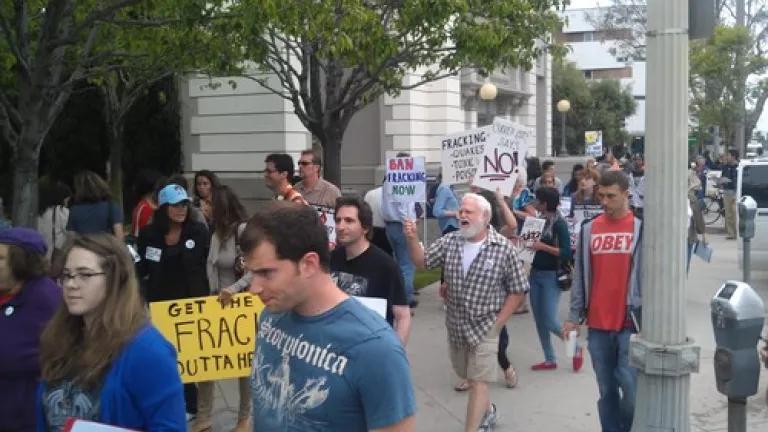
Protesters march outside the Culver City public workshop hosted by the California Department of Conservation in June.
Tomorrow afternoon, more than 100 concerned Californians are expected to turn out for a rally in Sacramento to bring attention to the issue of fracking. The rally is timed to coincide with the last of seven public workshops the Department of Conservation has been hosting over the past several weeks to solicit the public's input on new fracking regulations.
Throughout the summer, people from all over the state turned out at these meetings to voice their concerns about fracking. At the Culver City workshop, which I mentioned in a June blog post, more than 400 people filled the City Council chambers and two overflow rooms. The overwhelming majority of comments expressed serious concern about fracking's potential as a threat to drinking water, air quality, community health, and California's constrained water supply. At tomorrow's workshop in Sacramento, we will likely hear many of the same concerns.
And after tomorrow's workshop...then what?
It was explained to me at both the Culver City and Long Beach workshops that providing comments at these workshops is not actually part of the formal regulation making process. That process will actually begin if and when the Department issues draft regulations and invites public comment. I heard from one official that this might happen as early as sometime in the next couple of months, while another is guessing sometime toward the beginning of 2013. I would urge the Department not to rush the regulatory process and risk the omission of key health and safety provisions.
To assist the Department in its efforts, we've compiled a list of recommendations for the Department's consideration as it contemplates drafting new fracking regulations. I've covered some of our views in previous blogs, including our belief that a moratorium on new fracking should be put in place until adequate safeguards are established. While you can click here for our full list, a few of our key recommendations are as follows:
- Provide ample public participation opportunities during the regulatory process.
- Require companies to assess the area near the fracking site to ensure that there aren't any potential conduits (like an improperly abandoned well) that could lead to the pollution of nearby groundwater sources.
- Require detailed site characterization to ensure that oil wells are sited in locations that are geologically suitable for fracking or wastewater injection.
- Require the disclosure of the amounts of water and chemicals used in fracking, and the final destination of all waste generated.
- Consider a separate permit for fracking that is subject to the California Environmental Quality Act (CEQA), including public notice and full opportunity for public comment.
- Require companies to monitor for possible seismic activity, mitigate any induced seismic activity, and periodically report the results to the Department.
- Create a cradle-to-grave management system for all wastes generated through oil and gas development, including fracking fluids and produced water.
- Require baseline air and water testing before and after each frack job.
This list is by no means exhaustive, but it's a start, and we hope to expand on it with more detailed and technical comments if and when a set of draft regulations comes out. In the meantime, I hope that everyone who participated in these workshops will continue this important conversation and work collaboratively toward securing effective fracking safeguards for all Californians.
Photo credit: NRDC

